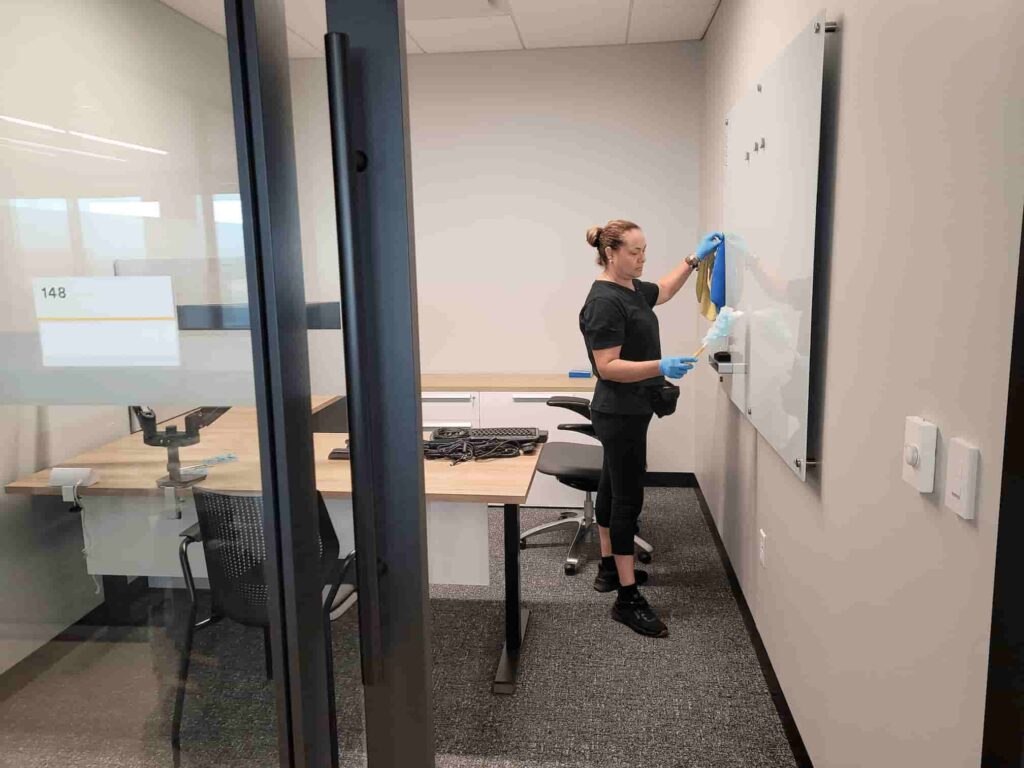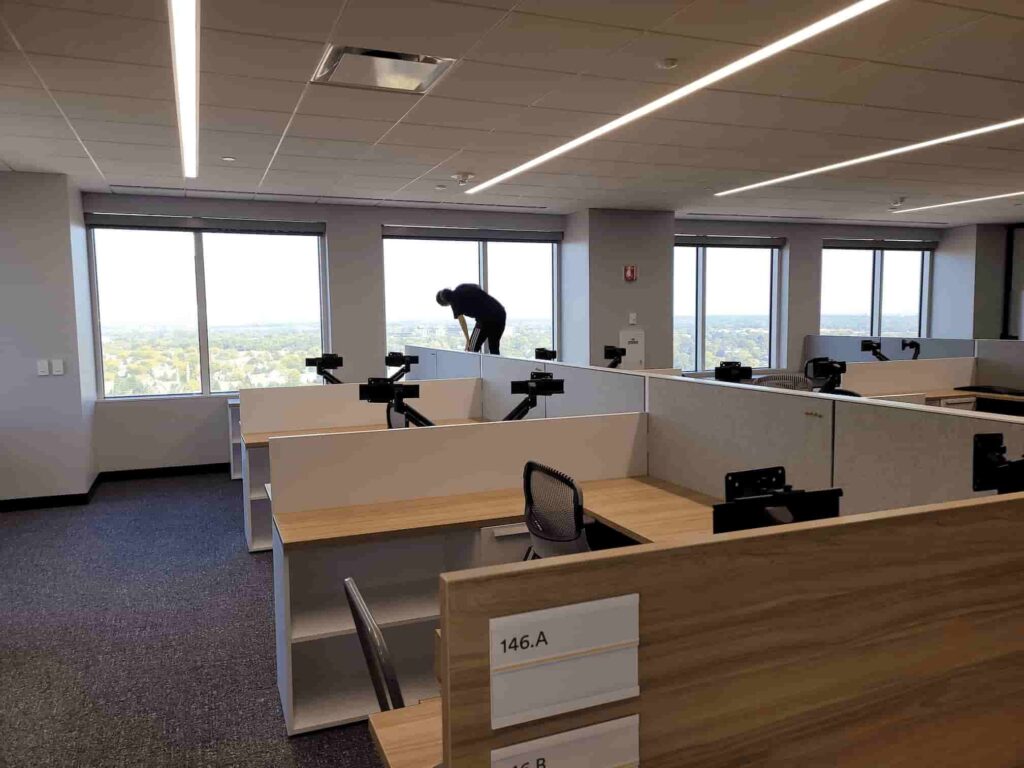Maintaining a clean and well-organized corporate office is more than just a matter of aesthetics; it plays a crucial role in productivity, employee well-being, and your business’s reputation.
In today’s fast-paced work environment, it’s easy for clutter to accumulate and for hygiene standards to slip without a structured cleaning plan. That’s why establishing a regular cleaning schedule for your corporate office is essential.
Let’s dive into why a cleaning schedule is critical for your business and how it can positively impact your office environment, employees, and clients.
The Impact of a Clean Office on Productivity
When it comes to workplace productivity, cleanliness might not be the first thing that comes to mind, but it can have a significant effect.
Imagine walking into an office filled with clutter, dust, and dirty floors. Not only does it look unprofessional, but it can also be incredibly distracting for employees.
1. A Clean Space Encourages Focus
A tidy, organized office allows employees to focus better on their tasks. When workstations are clean, with minimal distractions, employees are more likely to remain productive and efficient.
It’s harder to focus in an environment where clutter and dirt are piling up. Clean desks, organized files, and an overall neat environment help clear the mental clutter as well, promoting higher productivity.
2. Reducing Sick Days
Regular cleaning also reduces the spread of germs and illnesses. In communal office spaces, bacteria can easily spread, particularly through high-touch areas like keyboards, phones, and door handles.
A regular cleaning schedule, including the disinfection of these key areas, ensures that germs are kept in check, helping to prevent the spread of illness. Fewer sick days mean more consistent productivity for your business.
Creating a Positive First Impression
Your office is often the first point of contact potential clients and partners have with your business. First impressions are powerful, and a dirty or unkempt office can be detrimental to your professional image.
1. Reflects Professionalism
A clean, well-maintained office conveys professionalism. Clients, visitors, and employees all want to see that the environment is taken care of. It sends a message that your business cares about the details, which can foster trust and confidence in your operations.
2. Client Perception and Retention
When clients walk into a sparkling, organized office, they’re more likely to feel comfortable and valued. In contrast, a messy office can make them question the professionalism of your business.
A consistent cleaning schedule helps maintain a polished, welcoming atmosphere that clients and partners appreciate.
Maintaining Employee Health and Well-being
Employee health and happiness are essential for maintaining a motivated and productive workforce. A clean office can directly influence this in multiple ways.
1. Cleaner Air for Better Health
Regular cleaning, particularly of carpets, upholstery, and air vents, helps reduce the number of allergens and dust particles in the air. Poor indoor air quality can lead to respiratory issues, allergies, and fatigue, all of which can affect employee performance.
Scheduling regular cleaning to ensure air ducts are clean and surfaces are dust-free can improve overall air quality and contribute to a healthier work environment.
2. Improved Mental Well-being
A cluttered office can lead to feelings of stress and overwhelm. On the flip side, a clean and organized space promotes a sense of calm and control.
Employees will feel better about coming to work each day when their environment is clean, well-organized, and comfortable. It’s easier to feel motivated in a clean, welcoming space than in one that feels chaotic and uncared for.
What Areas in the Office Need Regular Cleaning?

While some areas of your office may only need periodic deep cleaning, others require more frequent attention. A regular cleaning schedule helps to ensure no area is neglected.
1. High-Traffic Areas
Spaces such as entrances, lobbies, and hallways experience heavy foot traffic throughout the day. Dirt, dust, and debris can accumulate quickly in these areas, giving your office a dirty appearance if not cleaned frequently. These areas should be swept, mopped, or vacuumed daily to maintain a pristine look.
2. Restrooms and Break Rooms
Restrooms and break rooms are high-risk areas for germs. They should be cleaned and disinfected daily to ensure employee health and well-being.
Regular cleaning of restrooms, sinks, kitchen counters, and communal appliances (like microwaves and refrigerators) is crucial to prevent the buildup of bacteria.
3. Desks and Workstations
Workstations, including desks, phones, and computers, are hotspots for germs. They should be wiped down regularly, especially high-touch surfaces like keyboards and computer mice.
Regular cleaning of these areas reduces the spread of illness and helps employees maintain organized workspaces.
The Importance of a Cleaning Schedule Over One-Time Cleanings
While a one-time deep cleaning may make your office look spotless for a short period, it doesn’t address the ongoing cleanliness needs of a corporate environment. A structured cleaning schedule offers several advantages over sporadic, one-time cleanings.
1. Consistency is Key
A regular cleaning schedule ensures that your office remains consistently clean, day in and day out. It prevents dirt and clutter from piling up and reduces the need for emergency cleanings after things have gotten out of control.
Maintaining cleanliness regularly means you never have to scramble to clean up before a big client meeting.
2. Prolongs Office Assets
Furniture, carpets, and equipment all last longer when they are regularly cleaned and maintained. Dirt and grime can wear down these assets over time, leading to more frequent replacements and higher costs.
A regular cleaning schedule helps preserve the longevity of your office’s assets, saving money in the long run.
3. Cost-Effectiveness
While a deep cleaning service may seem like a quick fix, the reality is that regular office cleaning services are often more cost-effective in the long term. Regular maintenance prevents the build-up of dirt and damage that could otherwise result in costly repairs or replacements.
Additionally, with fewer sick days and increased productivity, the benefits of regular cleaning pay off financially.
Customizing Your Office Cleaning Schedule
No two offices are exactly alike, which means no two cleaning schedules should be the same. Tailoring a cleaning schedule to your office’s specific needs ensures that all areas are properly maintained without overspending on unnecessary services.
1. Assess Your Office’s Needs
Consider the size of your office, the number of employees, and the areas that get the most use. Larger offices or those with many employees will likely need more frequent cleanings, especially in high-traffic areas. Meeting rooms, bathrooms, and break rooms will need special attention due to frequent use.
2. Establish a Cleaning Frequency
For high-traffic areas, daily cleaning is often necessary. However, less-used areas such as storage rooms or certain offices may only need weekly or bi-weekly cleaning. By determining how often each area of your office needs to be cleaned, you can create a balanced and efficient cleaning schedule.
3. Hire Professional Cleaners
Investing in professional office cleaning services ensures that your office is cleaned thoroughly and consistently. Professional cleaners have the expertise, equipment, and products to ensure that your office stays clean, sanitized, and presentable at all times.
Eco-Friendly Office Cleaning Practices
If your business is environmentally conscious, you may want to consider adopting eco-friendly cleaning practices as part of your regular office cleaning schedule. Green cleaning methods not only help protect the environment but also create a healthier workspace.
1. Non-Toxic Cleaning Products
Opt for non-toxic, biodegradable cleaning products that are free from harsh chemicals. These products are just as effective at cleaning and disinfecting but are much safer for the environment and for your employees’ health.
2. Reduce Waste
Incorporating green cleaning into your routine can also involve reducing waste by using reusable cleaning materials like microfiber cloths instead of disposable paper towels. This helps reduce your office’s environmental impact while keeping it clean.
Conclusion
Establishing a regular cleaning schedule is essential for maintaining a professional, healthy, and productive corporate office environment.
A clean office not only impresses clients but also fosters a positive work environment for employees, improving focus, reducing sick days, and enhancing mental well-being.
By assessing your office’s unique needs and creating a tailored cleaning plan, you can ensure that your space stays clean, organized, and inviting every day.
FAQs
1. How often should an office be cleaned?
High-traffic areas such as lobbies, restrooms, and break rooms should be cleaned daily, while desks and less-used areas may only need weekly attention.
2. Can regular cleaning help reduce employee sick days?
Yes, regular cleaning and disinfection of high-touch areas can reduce the spread of germs, leading to fewer employee illnesses and sick days.
3. Why should I hire professional cleaners for my office?
Professional cleaners have the tools, expertise, and products needed to thoroughly clean and sanitize your office, ensuring a consistently high standard of cleanliness.
4. What are the benefits of eco-friendly cleaning products?
Eco-friendly cleaning products are non-toxic and biodegradable, making them safer for employees and better for the environment. They still provide effective cleaning without the use of harsh chemicals.
5. Is a one-time deep cleaning enough for an office?
While a one-time deep cleaning can help, regular cleaning is essential for maintaining a consistent level of cleanliness and hygiene in an office environment.

